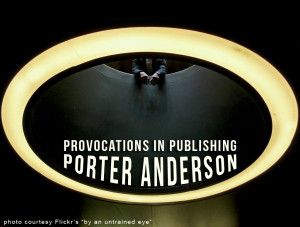Emergent Voices
By Porter Anderson (@Porter_Anderson) | August 21, 2020 |

Image – iStockphoto: Ruprech Judit
To Essay a Path Forward
A new collection of very short, quickly readable essays has been released by PEN America.
 Titled We Will Emerge, these essays are available free of charge online and are the result of a project initiated by Wajahat Ali and Dave Eggers during April of this year’s pandemic spring. (That last link is to Publishing Perspectives, where we have a great deal of coverage of the pandemic has it pertains to aspects of the world publishing industry.)
Titled We Will Emerge, these essays are available free of charge online and are the result of a project initiated by Wajahat Ali and Dave Eggers during April of this year’s pandemic spring. (That last link is to Publishing Perspectives, where we have a great deal of coverage of the pandemic has it pertains to aspects of the world publishing industry.)
The collection is cast in five chapters, many of the essays only a few paragraphs long.
And the topic, in general terms, is about what may lie on the other side of this (mercifully) rare confluence of pressures, challenges, and threats that face us today in the American culture and in many of our sister cultures and societies in the world. It comprises the work of 111 writers, activists, academics, poets, and public servants in a collaborative project to imagine a blueprint for a post-COVID America. I commend it to you.
The project signals two issues for me as a writer, and I’d like to put them to you today to consider, if you will.
First, the essay as a form can be fascinating in itself, not least because it’s a form in which a writer – especially one focused in fiction – emerges. No longer costumed in the creative drama of a story, an author-essayist arrives, to some degree, as a person revealed.
Not unlike meeting your favorite film actor, the experience can be jolting.
- Is this a person intellectually shorter or taller than you expected?
- More given to the vernacular than her careful fiction would have suggested?
- More hotly opinionated than the subtle characterizations in that last novel suggested?
These can be reasons, of course, for some authors to sidestep essay work. Sometimes one knows that the higher fire of expression, unscreened by narrative and setting and period, can be off-putting to some (while thrilling to others). Worth the risk?
There can be great power in the mere exercise of essaying, in the verb form – trying or testing a theory or a position or a reason for an action or a comment. There can also be pitfalls. Some courage may be required. And that, of course, means considering writing an essay is worth your time.
If Things Took a Turn

Provocations graphic by Liam Walsh
The second point of interest in the coming project for our purposes here has to do with the fact that a turning point was perceived in the development of the exercise.
The initial interest was addressing one thing.
And then another thing happened.
Anyone living in the current moment won’t be surprised at that. “Shocked but not surprised,” as we say so frequently now. Something new turns up hourly, “just when you thought it couldn’t get any …” worse? better? Fill in the blank.
A novelist knows this as a device, of course. Throwing everything possible at your already beleaguered protagonist, stacking tension on every page, ramping up the urgency. It reads better on paper than it feels in life, doesn’t it?
My provocation for you today, though, is just one step to the side of this.
If you were to hear a new voice, a new attitude, a new and unexpected tone come from your characters relative to a “just when you thought” event you hadn’t foreseen, what would it sound like? Have you ever heard it? Have you heard it in yourself?
Look at the piece you’re working on now. If the streets were suddenly filled with protesters, if the air was dust-moted with viral particles, if the economy cratered in Chapter 3, if schools failed to open, if hospitals were overwhelmed, if people were dying at a rate of one per minute as has happened recently in the United States … what voices would emerge in the world of your people?
What would they say to each other. Could you overhear them?
What would those people, themselves, need to do and think and become?
To a degree, of course, a creative work must be protected from the vagaries of a long, long moment like the one in which we’re living. Your selected narrative is devised, rightly, to de-select more than it selects, to carve out its mission and its statement, and tell its tale in the context you’ve chosen. That’s what makes it your book, the fact that it’s not IRL, in real life.
And yet, how much can you recognize in your fiction that sounds like your own voice, even whispering, its concerns, alarm, incredulity? What’s that essay about?
What might happen if the world you’re building crumbled, and not because of a jolt you’d dreamed up? What if someone else killed your darlings and re-edited your narrative? What voices would emerge? And would you hear them as yours?









Wow, Porter, great provocations today. I’m working on my third novel now, which ironically involves some familiar themes—climate disaster and false narratives among them. But the voices that came crisp to me recently, while contemplating our current real-world complex of disasters, were the protagonists in my last novel—sisters who might take very different stances in the face of potential illness and political strife. It was nearly enough to make me set aside my work-in-progress-all-over-the-kitchen-table and write a short story. I didn’t. But the intersection of reality with fully developed characters (who primarily grappled with different perspectives /perceptions of life) made for a good thought experiment.
Very interested to learn more about the embargoed book down the road. Thanks, Porter.
Porter, thanks for the provocation. I often question how freely I can express my views in this digital world. Some places welcome me, others might not. Though my WIP might be set a decade back, I do throw lots of problems at my characters, hoping they will respond with the heart and soul I presently want to have. As writers we are on a cusp of change. When someone recently quoted Kierkegaard, I actually teared up. I yearn for new voices, I struggle to think of what might be lost if those voices didn’t become louder and stronger. Can I be one of those voices? Yes, I’m ready.
With my second book, the story revolves around leadership. This was pre-2016 and in response to the Obama-Romney campaign, where the statement “Just because you can doesn’t mean you should” got stuck in my head. It’s crazy to me how some key elements that I have in that story with which I tried to use to demonstrate abusive leadership have now played out in real life –including kids in cages. :( My protagonist there did indeed have my voice, and maybe the whole story has an essay of my beliefs hidden inside of it.
With my current work in progress, it’s set in current day rural Nebraska. Instead of contemporary fantasy, it’s a cozy mystery. Having the more strict genre guidelines seems to have yielded a more independent protagonist. It is indeed a good provocation to think about how she might respond to current world events. Would she rise to the occasion and be a leader in her community? Would she whine about how things might never be the same? Would she become angry and insulting to those who don’t have the same views she does? Some of these answers are obvious, just because of who she is (or how I created her to be.) But, already I’ve noticed her having a bit of superior attitude with her sister, and she isn’t really generous with her. She might be a little more self-centered than I originally thought, and she may well respond to totally losing control of…everything…a little more poorly than I’d like her to. The question– the provocation–is, I suppose, would her voice sound like mine. Hmmm, that’s something to consider.
Thank you for the post, Porter, and I’m looking forward to hearing more about this new project.
I remember having my economic beliefs challenged by Janet Byrne’s 2012 collection of Essays ‘The Occupy Handbook’. The variety of voices she was able to gather was impressive, and their insights ended up changing my perspective on many issues. The biggest change was understanding the shifting relationship the younger generation has with money. Ambitions change.
In my latest WIP, I’m looking at another shift I see happening, and hope I’m open-minded enough to do write well on the subject.
Ah, the essay. My son took my copy of Montaigne to school. I’ll look forward to seeing the new collection. The essay is one of the reasons I still write for magazines. Fiction makes you delve deep so it’s a natural response to write about the things you’re thinking of. I always appreciate your provocations, Porter.
Although I’m working on a historical right now, it’s uncanny how the political air is similar to the one we breathe now. I’m almost tempted to pen another essay but I’d rather spend the energy on the book.